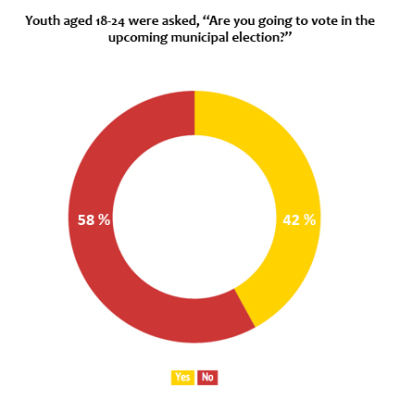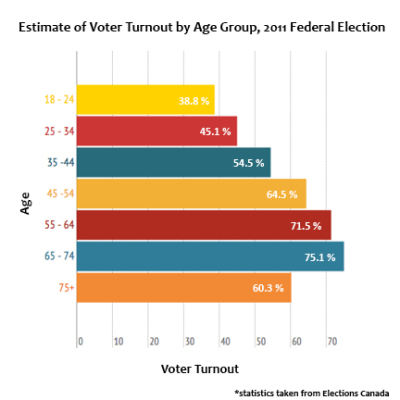STORY BY JEANYLYN LOPEZ
Young people are often criticized about their lack of interest in politics.
In an Elections Canada study after the 2011 federal election, it estimated that voter turnout steadily increased with age from 38.8 per cent for ages 18-24 in comparison to 75 per cent for ages 65-74.
We’ve tried to get youth involved for years and it doesn’t seem to work, said Mississauga mayoral candidate Steve Mahoney, who has run for all three levels of government.
“In the last municipal election for my wife [Katie Mahoney’s] campaign, we went into UTM and did all-candidates debates, knocked on doors of the residents, we went into the student centre and met with students and staff and we got two votes out of there.”
But Mahoney acknowledged that students who go to UTM might not vote there, and could be voting at home.
In comparison to federal and provincial elections, there are few stats on voter turnout rate in municipal elections. In a survey conducted by the Sheridan Sun, students were asked if they planned on voting in Monday’s municipal elections.
Of the 109 respondents aged 18 to 24, 58 per cent said they would not vote and 42 per cent said they would.
Of those who said they wouldn’t vote, 41 per cent said they don’t care about politics, 39 per cent said they don’t know who’s running and 20 per cent said it’s inconvenient for them to vote.
Survey responses asking why they are not voting ranged from, “Most candidates are in it for the politics and not the betterment of society,” to “The democratic elective process is not an effective form of government,” and “They’re all morons.”
 There are a couple of reasons why youth aren’t voting in municipal politics, said retired University of Ottawa professor Caroline Andrew in a phone interview.
There are a couple of reasons why youth aren’t voting in municipal politics, said retired University of Ottawa professor Caroline Andrew in a phone interview.
One reason is because there is a stereotype that municipal politics is about technical administrative matters related to the servicing of private property like sidewalks, streets and sewers, she explained. But those issues are factual compared to other initiatives cities are involved in, which are much more complex and involve partnerships and bringing people together. Because young people aren’t property owners, and they have this stereotype they think it doesn’t concern them as much.
Low voter turnout can also be a vicious cycle.
“Given there’s a low turnout, politicians focus on issues regarding people they know will go out and vote, and because youth don’t vote, politicians don’t plan their campaign thinking about their vote,” said Andrew. “They may talk about youth issues in a fuzzy way, but they don’t focus on youth groups because they know they won’t vote. That just makes the circle worse.”
Andrew’s research interests include municipal politics, social policies and women in politics.
There are initiatives such as the Coalition of Youth Councils and the app Pollenize, which aim to engage youth in politics and keep them informed.
According to the Coalition of Youth Council’s website it is a “federally registered not-for-profit corporation on a mission to increase civic participation amongst young Canadians by providing incentives and experiential educational opportunities.”
The CYC has councils in Toronto and Mississauga, and soon there will be one in Markham. The aim is to create a Youth Council in every city in the nation.
 “The main goal of the council is to increase youth civic engagement especially in politics,” says co-chair of the Mississauga City Youth Council Maxwell Tran. “We’ve organized a lot of politically oriented events, such as the [youth] debate and we also had a launch at Microsoft Square One, which was attended by dignitaries from all three levels of government.“
“The main goal of the council is to increase youth civic engagement especially in politics,” says co-chair of the Mississauga City Youth Council Maxwell Tran. “We’ve organized a lot of politically oriented events, such as the [youth] debate and we also had a launch at Microsoft Square One, which was attended by dignitaries from all three levels of government.“
The app Pollenize was created to inform young people about candidates running for Toronto mayor,. The visually appealing app tells users main points of candidates’ platforms on transit, property taxes, economic development and more.
“Our goal is to educate the uninformed voter, and do it in a way that’s not only entertaining but quick,” said project manager Miguel Barbosa. “Our goal is to show a nice wide view of the whole election in a digestible format.”
The idea started when Barbosa was watching the debates and someone asked the candidates how they were going to get young people involved. The answer given was off topic, and none of the candidates had a real initiative for youth.
Pollenize took about six months to develop and now close to 2,000 people have downloaded the app. With about 30,000 unique views, it was recently among the Top 10 most downloaded news apps in Canada.
“People think you need a full team and millions of dollars to make websites,” said Barbosa. “I hate to say this but adults love to complicate things and make their jobs seem way bigger than they are. We’re only six to eight students and we put this together in a few months. We could have put it together within a few weeks if we wanted to. It shows that with technology we could push it really far. The old business landscapes really make it slower than it needs to be.”

